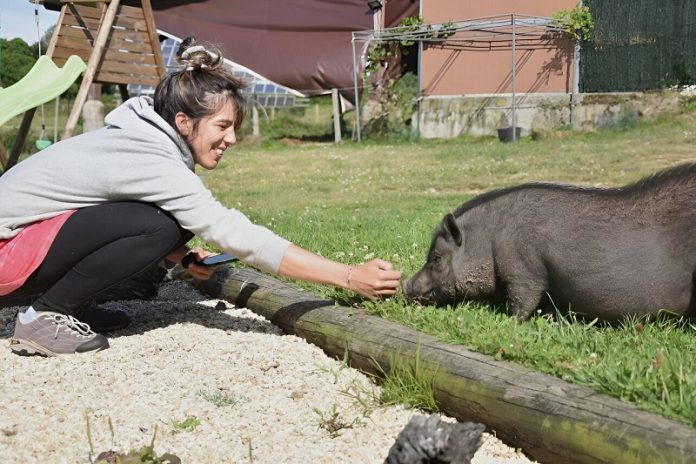
Researchers at the ELTE Department of Ethology in Budapest have discovered that while pigs are social animals, they do not form the same attachment bonds with humans that dogs do.
This study aimed to see if pigs could develop an infant-mother-like attachment to their human owners, similar to what is seen in dogs.
The findings, published in the journal Scientific Reports, show that despite being socialized with humans from a young age, pigs do not form the same type of bond with their owners as dogs do.
To conduct the study, researchers used the “Strange Situation Test.” This test compares how young companion pigs and dogs behave around their owners and a stranger.
They found that dogs showed a specific behavior pattern typical of attachment bonds, while pigs did not.
This suggests that simply being domesticated and exposed to humans is not enough for an animal to develop a strong attachment to a human caregiver.
The unique relationship between dogs and their owners has long been considered special. From an ethological perspective, this bond can be defined as “attachment,” similar to the bond between a human mother and her infant. In an attachment bond, the individual relies on the caregiver for security and uses them as a base when exploring new environments and as a safe haven in times of danger. This bond is also evident in the specific behaviors displayed when reunited with the caregiver after separation.
Anna Gábor from the Neuroethology of Communication Lab at the ELTE Department of Ethology, and first author of the study, explained that there have been few studies assessing whether other companion animals exhibit similar attachment behaviors. The question was whether such bonds could arise in other domestic animals through intense socialization with humans or if it was unique to dogs due to their domestication process.
To answer this question, the researchers compared young companion dogs and pigs. Pigs, like dogs, are group-living and very social animals. When kept as pets, they often take on a similar role in human families as dogs do. This made pigs an ideal species for comparison.
Using the Strange Situation Test, the researchers exposed the animals to periods of separation from their owners and encounters with a stranger. The test is designed to see if the animals show a distinct behavioral pattern toward their owners compared to strangers. The results showed that only dogs displayed the attachment behavior pattern toward their owners, while pigs did not.
“This finding suggests that the domestication process and intense human socialization alone are not enough to trigger human-analog attachment behavior in animals,” explained Gábor. “We believe that dogs were specifically selected for their dependency on and cooperation with humans, which is a unique aspect of their domestication.”
In conclusion, while pigs are social animals, they do not form the same strong attachment bonds with humans that dogs do. This study highlights the special relationship between dogs and their human caregivers, shaped by thousands of years of domestication.



